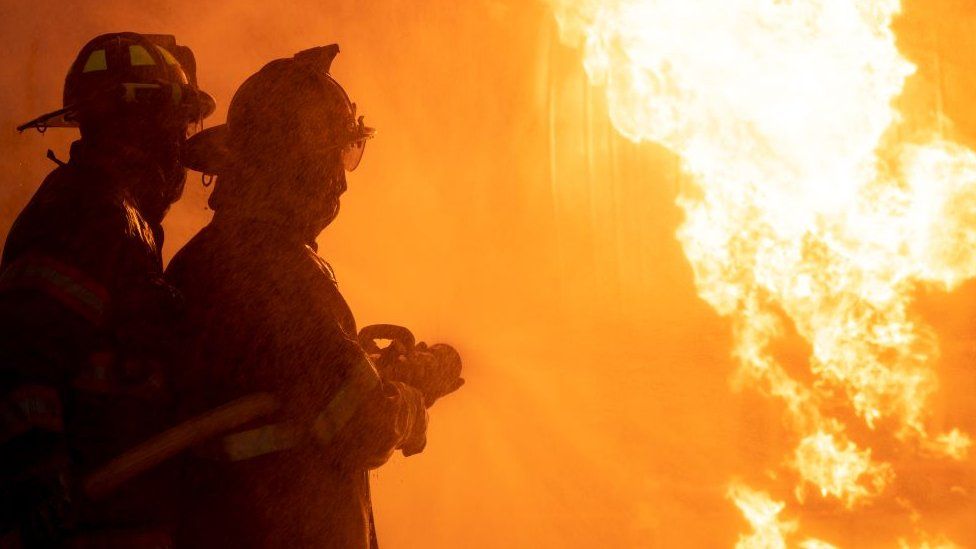NI fire service plan to allow more time to attend emergencies
- Published
- comments

Firefighters will be allowed more time to get to Northern Ireland's most serious fires if proposed changes to response time targets are approved.
The fire service wants crews to attend some emergencies within eight minutes - two minutes slower than the current six-minute target.
In a video, seen by BBC News NI, it said the proposal will not change "our response to you when you dial 999".
However, a DUP assembly member said the plan was a huge concern.
"We're told that every minute counts when it comes to serious fire incidents so what does this mean in terms of threat to life, serious injury and indeed property?" said Jonathan Buckley.
The Northern Ireland Fire and Rescue Service (NIFRS) told BBC News NI it would be premature to comment on the proposals until they have gone to public consultation. This is expected in the coming months.
What are the fire service's 999 response times?
Emergency calls relating to fires that happen at home are categorised into high, medium and low risk categories.
It has a target of attending at least 75% of these incidents within six, 12 and 21 minutes respectively.
However, the fire service's latest published annual report shows that, on average each month in 2022/23, it managed to attend 44% of the most serious fires within six minutes.
This is down from about 46% in the previous two years.
The figures also show it has failed to meet the 75% target for medium-risk fires in the same three-year period, though it has met the target for low-risk calls.

Fire services across the UK each have different targets for responding to emergencies.
The average response time for fires at homes in England last year was eight minutes, according to the Home Office.
What are the new NI fire service plans?
Under the new proposals, 999 calls relating to fires will be divided into five categories with the highest risk having a targeted response time of eight minutes and the lowest risk a targeted response time of 20 minutes.
A video by the Northern Ireland Fire and Rescue Service, which was shared with senior employees and has been viewed by BBC News NI, outlined some of the planned changes.
A screengrab from the Northern Ireland Fire and Rescue Service video shows proposed changes to response time targets
In it, the fire service said: "Our proposals won't change the current service or our response to you when you dial 999.
"Based on risk, some areas will see a slightly improved target time and some will see a slightly slower target time."
DUP assembly member Jonathan Buckley, a former member of Stormont's health committee, told BBC News NI he was worried about the proposal, adding that he would "like to know whether this is code for a reduction in deterioration in service provision".
"We have already seen fire stations removed from local communities and there is a fear and an anxiety around what that means for response times," he said.
SDLP assembly member Colin McGrath, who currently sits on Stormont's health committee, said the important thing was not to use "these targets as a target time".
"I think we should be getting to fires and other incidents as quickly as possible.
"That's more an issue of resources and we need to make sure that we have the proper resources available so that our firefighters can do the work that they need to do in a timely manner."
What else is the fire service proposing?
The current standards have been in place for 18 years and only measure response times for fires at homes - the new proposed categories will also include other types of building fires but not road crashes or other incidents requiring the fire service.
Both Mr Buckley and Mr McGrath said they were concerned the proposed new standards do not extend to all emergencies.
The fire service is also seeking to change how it reports this information, from a target percentage figure to a median figure.
In other parts of the internal video, it said the current measurement provides "limited performance management information" and that a median figure will offer "a consistent measurement of performance and improved data information".
It added: "We believe these changes will help us deliver a more effective, community risk focused, emergency response across Northern Ireland."
Related Topics
- Published1 February